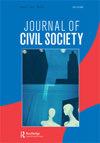Efficacy of civil society organizations to mitigate gender-based sexual violence in schools, in Liberia
IF 0.9
Q3 POLITICAL SCIENCE
引用次数: 0
Abstract
ABSTRACT Civil society can serve as a vital mechanism for monitoring and accountability in partnership with non-profit organizations and government agencies, in the global South. This research evaluates the impact of a 2018–2020 project empowering Liberian civil society organizations (CSOs) to supplement health initiatives to mitigate gender-based sexual violence in schools. Some scholars may question the capacity of CSOs in low-income settings to manage interdisciplinary health interventions. When provided with adequate training and support, third sector actors can serve as an added mechanism of advocacy, monitoring, and accountability, particularly in resource-poor environments. This study presents a statistical analysis of survey data collected at baseline and endline of 30 participating CSOs trained to monitor and prevent sexual violence in 88 schools in randomly-selected communities within 15 districts. Representatives of selected CSOs from project sites receive ongoing training and mentoring by non-profit social workers to conduct evidence-based research to 1) monitor local schools for gender-based inequity and sexual violence of students and 2) support immediate improvements within learning environments. Results indicate that the CSO intervention offers significant, efficient, and rapid change, particularly in harmful learning environments.利比里亚民间社会组织在减轻学校中基于性别的性暴力方面的成效
在发展中国家,公民社会可以与非营利组织和政府机构合作,成为监督和问责的重要机制。本研究评估了一项2018-2020年项目的影响,该项目授权利比里亚民间社会组织(cso)补充卫生倡议,以减轻学校中基于性别的性暴力。一些学者可能会质疑低收入环境中公民社会组织管理跨学科卫生干预的能力。如果提供适当的培训和支持,第三部门行动者可以作为宣传、监测和问责的附加机制,特别是在资源贫乏的环境中。本研究对30个参与的民间社会组织在15个地区随机选择的88所学校接受监测和预防性暴力培训的基线和终点收集的调查数据进行了统计分析。被选中的来自项目点的公民社会组织代表接受了非营利性社会工作者的持续培训和指导,进行基于证据的研究,以1)监测当地学校的性别不平等和学生的性暴力,2)支持立即改善学习环境。结果表明,公民社会组织的干预提供了显著、有效和快速的改变,特别是在有害的学习环境中。
本文章由计算机程序翻译,如有差异,请以英文原文为准。
求助全文
约1分钟内获得全文
求助全文

 求助内容:
求助内容: 应助结果提醒方式:
应助结果提醒方式:


